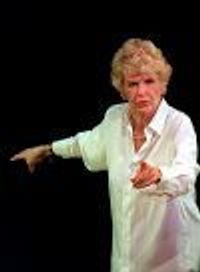refusing to cuss in a show
Blair
Broadway Star Joined: 11/4/03
#25re: refusing to cuss in a show
Posted: 8/12/09 at 3:33amIn high school, I was in a production of Oklahoma, and during tech week, our professional pianist told our director that he would get up and walk out of the performance if the actors said any of the curse words written in the script. So, because we could find anyone else on such short notice, "damned" turned into "durned" and we went on with the show. It was ridiculous.
#26re: refusing to cuss in a show
Posted: 8/12/09 at 7:37amI had to say the slightly stronger alternative to 'what the heck' when I was in a play a few years ago, and I felt slightly guilty about it, but not too bad. Then, two weeks later, our Sunday school lesson mentioned that if we were in a play and the play called for us to swear, we should drop out. That definitely made me feel good...
Phyllis Rogers Stone
Broadway Legend Joined: 9/16/07
#27re: refusing to cuss in a show
Posted: 8/12/09 at 9:28am
right.. because EVERY show has been performed EXACTLY like how it's written...
Of course it's not, but legally, when you acquire the rights to a show you are agreeing to do it as written. And why stop at swearing? Maybe you are doing ReNt in a community that doesn't have the comfort level to deal with gay relationships. Simple. Make Angel a woman.
why stop at just words...
Again, I ask why the playwright (or book writer) deserves so little respect.
let's fire people who riff when they sing songs...
Frankly, I'd love that. There's no legal cause for it, but I'd love people to stick to a one note once in a friggin while.
You can make hysterical examples all you want, but it still just boils down to the fact that some of you think that the person who actually wrote the words isn't nearly as important as he that says them.
#28re: refusing to cuss in a show
Posted: 8/12/09 at 9:56am
I agree with Phyllis.
Let's take another example: Booth in "Assassins" has to say (sing, actually) the n-word. Okay to omit it? Say "black gentleman" instead?
Or is it simply the "I'm a Christian, I can't say 'goddamn'" folks who should get a pass?
husk_charmer
Broadway Legend Joined: 10/19/06
#29re: refusing to cuss in a show
Posted: 8/12/09 at 9:56am
clearly I'm in the minority on this one.
I personally don't see anything wrong with (and this is at the school/community level) altering or removing curse words. Typically, it is not going to have that much of an overall effect on the piece. And most of the time, I doubt a playwright cares as long as they get their royalty check. (Besides, you can't tell me that Mamet has a purpose behind every use of the word 'f**k' in "Glengarry Glen Ross")
Now, on a professional level, there are enough shows out there that don't use curse words, that if a person has an issue with it, they can avoid it. It's the same thing as those who don't want to do a nude scene.
And, whoever said that the nude scene was essential to HAiR...it really isn't...it's a 20 second strip during "Where Do I Go?" that a lot of times pulls focus away from the song.
#30re: refusing to cuss in a show
Posted: 8/12/09 at 9:59amWait, are you saying there's a song going on while they're stripping?
husk_charmer
Broadway Legend Joined: 10/19/06
#31re: refusing to cuss in a show
Posted: 8/12/09 at 10:05am
taz-
While I'm sure that was sarcasm, yes. There is a song (and one of the best ones in the show, IMHO).
#32re: refusing to cuss in a show
Posted: 8/12/09 at 10:10am
I was indeed kidding husk, I agree it is one of the best songs in the show.
And I was agreeing that nudity can be distracting and in this case isn't absolutely necessary.
Phyllis Rogers Stone
Broadway Legend Joined: 9/16/07
#33re: refusing to cuss in a show
Posted: 8/12/09 at 10:10am
This isn't directed at Husk (or anyone, but rather a generalized comment about the overreaction to onstage nudity) I think it depends on how it's done and what your feeling are about nudity. Some people - especially gay men - have to make a big production of out seeing naked bodies on stage (as someone who has been in four productions involving nudity I can attest to that). Personally, I get my rocks off alone, so when I see nudity onstage I'm able to take it in context it's presented as opposed to "Oh my god, look at that dick!"
I personally don't see anything wrong with (and this is at the school/community level) altering or removing curse words. Typically, it is not going to have that much of an overall effect on the piece. And most of the time, I doubt a playwright cares as long as they get their royalty check. (Besides, you can't tell me that Mamet has a purpose behind every use of the word 'f**k' in "Glengarry Glen Ross")
I think that's a dangerous road to go down. You're assuming you know the playwright's intentions, as well as stating that his intentions could not be more important that your (and this is a royal your, not to you specifically) reasons for not wanting to say certain words.
Unless I'm watching some sort of crappy playwright like Theresa Rebeck or that guy who wrote Dog Sees God, I assume the playwright DOES put every word in there for a reason.
Updated On: 8/12/09 at 10:10 AM
#34re: refusing to cuss in a show
Posted: 8/12/09 at 10:10am
I am very proud of the fact that our local high school does not alter scripts at all. My first experience seeing one of their productions was a few years ago when they took on Les Miserables. I couldn't figure how they were going to clean it up for a high school audience; to my surprise they didn't, and the results were amazing. I was honestly stunned that they could pull it off so well.
Of course, now that my youngest is entering high school, and she has expressed interest in trying out for shows...
#35re: refusing to cuss in a show
Posted: 8/12/09 at 10:12am
Husk, I'd love to hear your thoughts on the "Assassin" example.
Here's my thinking: curse words are seldom literal. "F*ck" doesn't usually mean intercourse; "goddam" seldom means "I want the Creator of All to condemn your soul." It's an intensifier of sorts, an indicator of emotion.
But the n-word means the n-word. The character is actually using that word to signal his feelings about that race. To me that seems--as a word--worse than cursing.
Would you alter it?
#36re: refusing to cuss in a show
Posted: 8/12/09 at 10:14am
"I think that's a dangerous road to go down. You're assuming you know the playwright's intentions, as well as stating that his intentions could not be more important that your (and this is a royal your, not to you specifically) reasons for not wanting to say certain words."
Exactly Phyl. This is why I am so against HS versions of Rent and Spring Awakening.
#37re: refusing to cuss in a show
Posted: 8/12/09 at 10:14am
It is certainly fine for someone to drop out of a show because they dont want to say a word or do a nude scene. It is also more than fine for them to be fired for the same reason. That street must go both ways. If a producer/director wants to bastardize someone's script or lyric, that is wrong, but it goes on all the time in the amateur world.
The example of every actress having to show her boobs is ridiculous...every female character in every movie wouldnt show her breasts, but if the character would, the actress should or turn down the role.
I had to laugh at the dude who didnt know the plot of Carousel, but was cast as Billy.
My point is that if you dont want to say goddamn, dont audition for the bag lady in Rent, idiot!
I was played the lead in Shenandoah in high school and the director decided to take out the word "teat" as it would likely just make people giggle...like it did in the first reading. I didnt have a problem with saying it anyway and we discussed it together. Having people titter during that dramatic speech was not a risk he wanted to take, so it was gone.
The bigger sin was that I was a high school kid with braces playing a 50 year old father of five!
"In Oz, the verb is douchifizzation." PRS
husk_charmer
Broadway Legend Joined: 10/19/06
#38re: refusing to cuss in a show
Posted: 8/12/09 at 10:30am
I agree with those against the school editions of "RENT" and "Spring Awakening." My statements are more towards the:
Is it more important that a high schooler be exposed to Arthur Miller's "All My Sons" (Who I'm almost positive uses goddamn at least once in that piece) and cut/alter a swear word than to make them do a show like "Miss Kitty or Who Robbed the Bank?" (or some other equally noxious melodrama). When the word isn't crucial to the play, and in many cases I feel curse words aren't, I see no problem doing it. And, for the record, I'm stating that goddamn and f**k are curse words. Those are the ones school boards typically take issue with (at least, in my experience).
Now, when it comes to things like "Assassins," obviously it's not something to be changed. At that point, I feel it's vital to the piece. But the one random "goddamnit" that's in the actual liscened script for the RSC "Wizard of Oz" has absolutely no purpose, and I actually have more qualms with it being in there, than it being cut.
Am I making any sense...I'm running on little sleep and no coffee.
#40re: refusing to cuss in a show
Posted: 8/12/09 at 10:55am
That makes perfect sense.
Unfortunately there are those (and I don't believe anyone here)who feel Miller, O'Neil, etc. shouldn't be taught or performed for that very reason.
Which is just sad.
Phyllis Rogers Stone
Broadway Legend Joined: 9/16/07
#41re: refusing to cuss in a show
Posted: 8/12/09 at 10:59amI get what you're saying and I truly DON'T think it's all black and white, but it's a slippery slope when you start deciding that you know better than the people whose work you are presenting.
#42re: refusing to cuss in a show
Posted: 8/12/09 at 11:03am
Bottom line is that it is not the person playing the character who is swearing, it is the character. It is extremely unprofessional and childish if the actor refuses to use a curse or swear word.
It's one thing if it is a school production, but anywhere outside of that is unacceptable.
Fosse76
Broadway Legend Joined: 3/21/05
#43re: refusing to cuss in a show
Posted: 8/12/09 at 11:07am
"But the difference was was that it was pretty clear to me that it wasn't dubbed and that the actors were saying different words. Keep in mind, that they all weren't dubbed. And, that that part of the film was not the only part that showed swearing."
I'm 99% sure the actors were told not to say f*ck because of the filming. The intent was to release the documentary theatrically and they knew which characters they were going to focus on. The fact that different actresses were using the same substitute word shiould have been the first clue.
"When the word isn't crucial to the play, and in many cases I feel curse words aren't, I see no problem doing it."
In YOUR opinion. You are NOT the author and have no right to decide which words are crucial and which aren't. If you can't do an Arthur Miller play AS WRITTEN then you shouldn't do it. The actors in a play aren't more important the the words on the page.
#44re: refusing to cuss in a show
Posted: 8/12/09 at 11:12am
The riffing argument, which I know is secondary in this thread, reminds me of a story I read about Adelina Patti. According to the wiki, when she performed an aria from The Barber of Seville in front of its composer, Gioachino Rossini, adding her own embellishments, Rossini applauded with the words, "That was wonderful - who wrote it?".
If you're riffing or embellishing to the point that the song becomes unrecognizable...you're doing something wrong.
The same could definitely be said about editing and tweaking scripts, too.
#45re: refusing to cuss in a show
Posted: 8/12/09 at 11:12amEvery word is crucial.
husk_charmer
Broadway Legend Joined: 10/19/06
#46re: refusing to cuss in a show
Posted: 8/12/09 at 11:39am
Fosse76-
When on earth did I say I was the author?
And, again, I'm stressing in a school/community theatre situation. Not the professional world.
And, for those who are adamant that every single word is crucial. Find me five lines in any play, that you are likely to see done by a typical High School, where the removal of a curse word makes such a major difference that the effect is totally and completely lost.
#47re: refusing to cuss in a show
Posted: 8/12/09 at 11:55amHow about "Out, damn'd spot! out, I say!"
Phyllis Rogers Stone
Broadway Legend Joined: 9/16/07
#48re: refusing to cuss in a show
Posted: 8/12/09 at 11:57am
Hell, if most school boards understood Shakespeare they wouldn't allow HALF his plays. But Shakespeare's work is public domain. You can do whatever the hell you want with it.
husk_charmer
Broadway Legend Joined: 10/19/06
#49re: refusing to cuss in a show
Posted: 8/12/09 at 12:00pm
Reg-
Damn, and 99% of it's variations are allowed in public schools, particularly where Shakespeare is involved.
And darned (while awkward) would easily replace it, so could curs'd. Still keeps the meaning.
Videos







